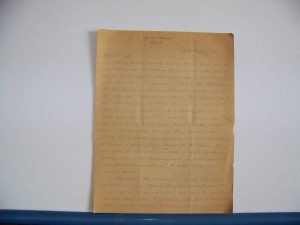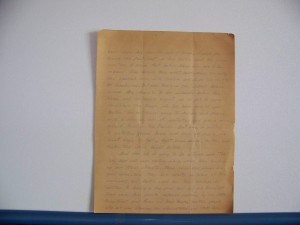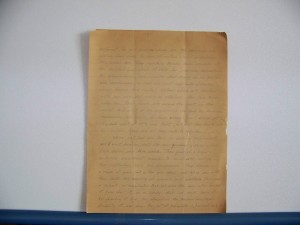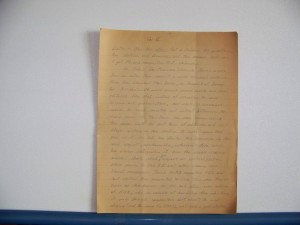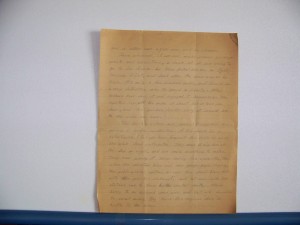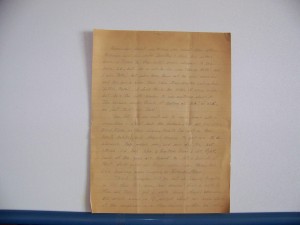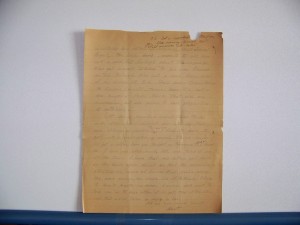Dart’s letter today is a fascinating one, in what he calls two volumes. It opens with a beautiful description of a perfect dawn over Treasure Island. The fog burned off early, the sky and the water are almost the exact same shade of crisp, deep blue. For once there is no wind and the brilliant sunshine is illuminating the buildings of San Francisco in sharp relief. “All we need is Tschiakovsky’s fifth or seventh symphony playing softly in the background, and you beside me with our hands intertwined, to make this scene a perfect solitude.”
He notes that today is the halfway point in his stay at Treasure Island. He says there’s almost no chance of anyone in his class going to advanced school in San Diego from here; no one has out of the last three classes. Nearly all have been assigned directly to their ships. He doubts there is a chance he’ll be seeing the east coast or Ohio any time soon. He’s learned that before Navy men are released from service, they must have some sea duty. Married men with families will be released first, when the war is finally over. But before that can happen, the Amry forces will be disbanded. As an unmarried sailor with no sea duty, he falls to the bottom of the list for discharge. But first, he must win the war.
With a sense of gravity, he writes that the Navy’s toughest work is still ahead of them. Until now, their main job has been to protect and support the ground forces throughout the world. But now, in addition to those duties, they must begin to fight; fight harder, farther and longer than ever before.
He believes the job is going to be a very tough one. “The Japs have not been resting while we’ve been building up our Naval strength. Their ships and planes are good ones and they are crafty imitators of the machinery and tactics used by their enemies, in addition to having a few cruel and ruthless tricks of their own.”
Dart gets a bit political in his next thought. He writes that despite repeated warnings from the State Department and military heads that the U.S. was unprepared, certain people are criticising the Administration for our unpreparedness. He says these are often the same people who “sold us down river” for fear of inciting the Japanese, or because they trusted her. Now Japan is exceedingly well-prepared with sophisticated equipment and knowledge. Says Dart, “We really do have a rough road ahead of us…but it’s not the fault of our leaders.”
Switching gears, Dart discusses one of his classes called battery allignment. He sticks to his promise of not boring Dot with details, but he explains that the course consisted of the guys receiving a thick technical manual to mull over while the instructor read the newspaper. Later, they were allowed to play with a couple of guns in the gun shed. No one could figure out if the material was so simple it could be learned by osmosis or so complicated that even the men who devised it didn’t know how to teach it. This morning’s test gave them their answer. Dart aced it.
Volume II of the letter begins with another political message. He was happy to read a reprint of an editorial from the Cleveland Plain Dealer in the SF Chronicle this morning. The op ed piece was in support of Dewey for President. Dart goes on to say that the PD has long held a reputation for having the best editorials and political writing in the country – no mudslinging or bitterness – just reasonable and factual arguments for candidates and issues. Dart hopes all parties on both sides will run clean campaigns. He believes Dewey will beat FDR, but in either case, a good man will be chosen.
He tells Dot of his plans to see LA if transportation details can be arranged. Several guys he knows have taken Naval flights down state to visit the city. With the planes ticking off the miles at a rate of between 150 and 400 mph, it’s a great way to spend some liberty time.
Dart seems to be in an expansive mood tonight with a lot on his mind. Next he tackles a lively description of the frequent fire drills on the island, made necessary by the flimsy, temporary wooden buildings that pepper the place. Because a fire here would be a catastrophe, they drill at all hours with plenty of apparatus.
He tells Dot a cute story about his classmate named Peterson, with the wife named Dorothy. She has moved to San Francisco to be near her husband until he is shipped out. For a while, the guys were calling the other Peterson “Young Pete” until they realized he’s two years older than Dart, and married, to boot. Now they call him “Little Pete” and Dart is simply “Pete.” The other one is too mild-mannered to complain about the nickname he’s not thrilled with. Dart simply says, “The fellas never think of just calling us ‘Dart’ and ‘Bill.'”
Now he poses a gripping question. Would Dot like it if he returned home with a moustache? Several of the guys are emulating Errol Flynn in their shaving habits. Others look more like Groucho Marx. Both Pop and Dot’s Dad wear moustaches, but Dart suspects he’d end up looking “like a fugitive from a cat fight.”
A recent letter from his friend John Angel brings news of a few of the old neighborhood boys. The lucky Angel may get a furlough over Thanksgiving and marry his fiance then.
With the sun glowing so brightly Dart says it’s hard to get into a woo pitching mood. He hopes he gets a letter from her later in the day. (And in the margins, confirms that he got a great one.) He hopes his letters to her get back on track. Perhaps his studying has affected his sense of humor. “Now you’re seeing the more serious, less affable side of Peterson! I hope it doesn’t frighten you away. I surely don’t want to lose you or have one of us get tired of the other now that we’ve fallen so deeply in love.”
Don’t worry, Dart. Keep writing letters like this one and you’re good for life!
